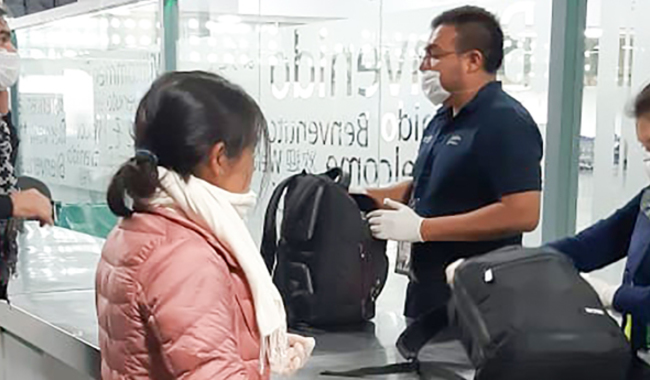With these measures, it contributes to preserving the national food supply and the assets of Mexican producers, especially small-scale producers.
In order to expedite the entry into Mexico of vacationers who will visit us during the winter season and of Mexican nationals who will return to the country, the Ministry of Agriculture and Rural Development invites them to find out about the animal and plant products that can enter the country.
As it does every holiday season, the National Service of Agrifood Health, Safety and Quality (Senasica) is reinforcing the tourist inspection program at 41 airports, 22 ports and 27 border points.
The purpose of this program is to prevent the introduction of agri-foodstuffs that could carry pests and diseases of economic importance and affect the country's agricultural, livestock, aquaculture and fisheries production.
With these measures, the Agriculture Agency is helping to preserve the national food supply and the assets of Mexican producers, especially small-scale producers.
To fulfill this task, more than 1,400 agronomists, veterinarians and biologists work 24 hours a day at points of entry into the country to check commercial shipments, tourists' luggage from abroad, and to secure the remains of food consumed on airplanes and ships, in order to verify their proper destruction.
The Ministry of Agriculture's sanitary inspection officers are supported by more than 80 trained dogs, which are capable of checking 100 suitcases in 10 minutes, while it takes one person five to 10 minutes to inspect a single piece of luggage.
The cooperation and awareness of vacationers is of utmost importance for the work carried out by the Agriculture agency, so it extended an invitation to tourists to enter the Senasica website: http://bit.ly/3uMeueP and consult the products that are allowed and prohibited to enter the country before traveling, so that upon arrival in the country they have a positive experience, free of mishaps and delays.
Among the pests and diseases that pose the greatest risk to the agri-food sector are the Khapra weevil, African swine fever (ASF), banana wilt caused by Foc R4T and, during this season, highly pathogenic avian influenza, which have the potential to cause significant damage to agri-food production.
For this reason, it is not allowed to enter with products of vegetable or animal origin of homemade or handmade preparation, hunting trophies or handicrafts that do not meet sanitary requirements, pots or articles with animal, vegetable or unknown content, fresh meat of any species, clothing with animal remains, fresh cheeses, sausages and eggs, among others.
Sanitary devices
If during your arrival in Mexico a Senasica official detects and retains any of the products with entry restrictions, he/she will give you a document specifying the reason for the retention and whether it is possible to recover it for return.
Products that cannot be recovered or returned to their place of origin are destroyed in order to mitigate the risk they represent for the spread of pests or diseases of economic or quarantine importance.
If you travel with dogs or cats, it is essential that you present their Health Certificate at the Agricultural Health Inspection Offices (OISA, by its Spanish acronym) of Senasica to obtain a free Animal Health Import Certificate (CZI, by its Spanish acronym) for the pet, in the following link you can consult the requirements https://bit.ly/413Nbc5.
Additionally, if you frequently travel to Mexico with your dogs or cats, we recommend you to subscribe to the Frequent Traveler Pet Program, whose requirements can be consulted at the following link: https://www.gob.mx/senasica/documentos/programa-mascota-viajero-frecuente?state=published.
In the case of traveling with another animal species, it should be noted that the Federal Animal Health Law does not consider ferrets, canaries, hamsters or Australian parakeets as pets, species that may be carriers of diseases that could affect Mexico's livestock heritage, so only animals that meet the animal health requirements established in the module of Senasica's website https://bit.ly/46y7Ztu can enter the country.
